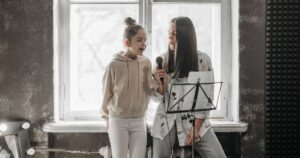Lucia Neville reveals the huge mistake she made on her vocal rehab journey and how she eventually saved her voice and singing career.
“The thing with vocal injury is it’s very scary,” says Australian singer and vocal coach Lucia Neville. “It’s one of the worst feelings in the world.”
Lucia’s singing career was twice threatened by serious voice problems. So what went wrong – and then right – for Lucia?
It all started when she was 21 and could finally afford singing lessons. Lucia found a teacher and got started, but nothing she learned in those early sessions really stuck.
“Looking back, I didn’t take it seriously enough,” she says. “I was in the mindset that singing is this magical thing that happens and you either have it or you don’t.
“In hindsight, I was getting out what I was putting in – which wasn’t very much as I wasn’t doing the exercises consistently enough to get results.”
Nevertheless, Lucia was soon gigging with a band. “I had no idea what I was trying to achieve; I was just riffing and ended up singing rock.”
However, by her mid-20s, Lucia’s vocal stamina was waning during performances. Sometimes lost her voice altogether after gigs.
“I didn’t think it was a massive issue until it started to happen often, and I realised I needed to get it sorted.”
After being told she had soft nodes on her vocal cords, Lucia found a vocal coach to help her address the problem.
The pair bonded and worked together for a year, during which time Lucia learned about breath control and improved her resonance and head voice.
But then she made a huge misstep in her vocal rehab journey.
My big mistake
Keen to get her career back on track, Lucia assumed she’d solved the problem and could move on.
“So I joined a different band, one that worked much harder and did a lot more gigs and rehearsals.”
A heavy touring schedule and haphazard approach to vocal health took its toll in the form of chronic laryngitis.
“In hindsight, I developed my second vocal injury because I didn’t continue the work that I had started and fell back into old habits. Because I was so driven, I often pushed through and sang when I was sick.”
The catalyst came when a voice teacher approached Lucia after a gig and said she could hear an issue with her voice.
“At first, I was like ‘excuse me’. But a few days later I thought: ‘I’ve been waiting for someone to say that to me. Something isn’t right’.”
Round two of vocal rehab
Aware that her career was at risk unless she could get to the root of the problem, Lucia contacted the teacher and asked for help.
“One of the nicest compliments I got was when we were working on a Duffy song, and I was trying my best to sound as bluesy as possible. My teacher said my voice was nice as it was and encouraged me to go back to my more neutral, natural sound.
“That was a lightbulb moment for me.”
Other issues Lucia had to address were volume control and navigating vocal registers. “I just wanted to be big and loud. But I would start to get towards my passaggio, and I would be pulling up in chest. My voice would be cracking and sounding very flat and dull.
“My teacher helped me to cross over that line in more of a mix by getting me to eliminate all the volume and just get that natural, neutral tone to carry over the break. We spent about a year or so just working on my natural, more neutral, tone.”
Results
Lucia was diligent with her practice routine and, over time, her hard work paid off. Instead of struggling through a few songs, she can now sing for three hours. Her volume control has improved, too.
“Now, I can do what I dreamt of with my voice in a consistent, medium volume – whereas before, it was extremely loud, and there was no dynamic.
“Once I could sing at a more consistent volume, I was able to reach higher and higher notes and get a better tone and more texture.”
Sharing her knowledge
Lucia’s vocal rehab experience has influenced her approach to teaching.
In the early singing days, Lucia sometimes cried during lessons because she felt so lost and out of her depth. That’s something she doesn’t want her students to go through.
“I remember what it is like to go into a singing lesson and have no idea what is going on and no concept of how it will help,” she says.
“And because of my experience with vocal injury, I’m hyper-vigilant of anything that could take a singer down the same path that I went down.”
However, she’s also aware that singers need to take responsibility for their vocal education.
“As teachers we put a lot of responsibility on ourselves, but students have to commit to consistent practice. Looking back, real change depended on me putting in the work.”
Listen
Learn more about Lucia’s story by listening to her interview on the Singing Teachers Talk podcast.
Study with us
Take control of your own vocal health and discover how to help other singers develop healthy vocal habits by studying with BAST Training. Sign up here.




